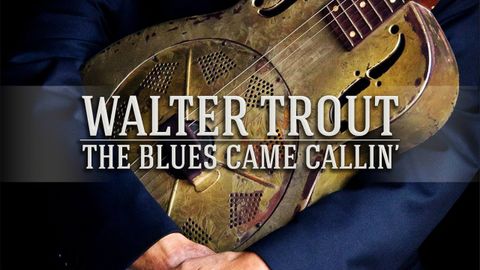There’s a track on Walter Trout’s 2010 Common Ground album called No Regrets,
Four years on, as Trout waits for the chance of a life-saving liver transplant, he’s still not looking for anyone else to blame. Instead he faces his own mortality on The Blues Came Callin’, not with acceptance but with the same vigour that’s always characterised his sturdy blues-rock style. Only this time it palpably stiffens his resolve to fight on.
He’s in your face on the opening Wastin’ Away, confronting his own shrunken body in the mirror. He’s not happy about it as the low, growling riff and angst-laden vocals make clear, but his strident guitar solo swats away any concerns you might have for his state of mind.
Trout also uses a couple of his story songs – a genre at which he excels – to explore his own predicament. On The Bottom Of The River he’s trapped by the current and losing the will to struggle up to the surface until he hears a voice that says, ‘This ain’t your time to die’. And on the title track he’s lying in bed when the blues seeps in through the window and starts to smother him. This time it’s John Mayall who comes to the rescue with an incendiary solo on his B3 Hammond.
Trout’s one-time boss also joins him for a cover of their joint hero J.B. Lenoir’s The Whale Has Swallowed Me (‘I do believe one day/I will crawl outta here’) and gets name-checked on the spontaneous instrumental jam, Mayall’s Piano Boogie, where Trout’s off-the-cuff solo takes a subtly different direction than usual.
But Trout is not so self-absorbed with his own problems that he’s losing his perspective. On The World Is Going Crazy (And So Am I) he wryly notes that the world is even more messed up than he is. The slow but funky Hard Times explores how the mind can keep you caged in rather than setting you free, while Born In The City is a hard-driving urban blues with Trout so energised you can hear him urging the rest of the band on. The only people he takes issue with are some of his former managers on the fierce, contemptuous Willie.
The final track, Nobody Loves Me Like You Do, is a special blues for Trout’s wife and manager, Marie, but there’s nothing sentimental or maudlin about it; indeed his strong, fluid solo is one of the most uplifting on the album. Trout may be physically weak and wasted but there’s little sign of it in his voice or his playing.
Via Provogue


